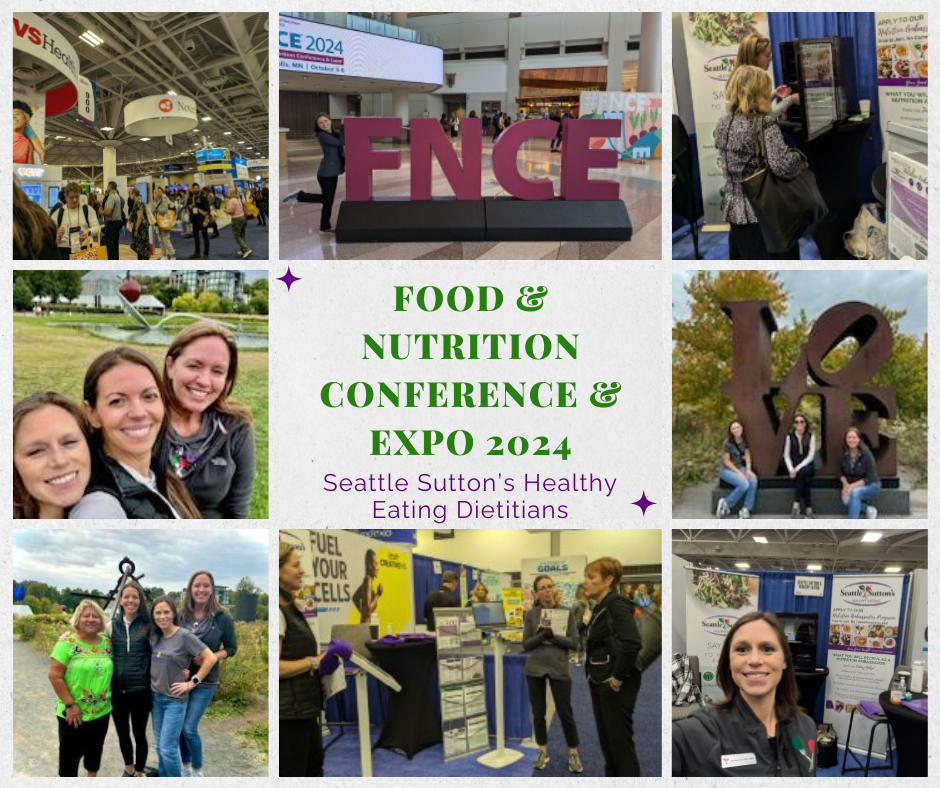Health & Nutrition Insights: Key Highlight s From FNCE 2024
Every year nutrition professionals from around the world get together for the Food & Nutrition Conference & Expo (FNCE), which is organized by the Academy of Nutrition and Dietetics. It brings dietitians, researchers, food industry experts, and other nutrition professionals together to discuss the latest research, trends, and best practices in nutrition and dietetics.
Seattle Sutton’s Healthy Eating dietitians attended the event where they had the opportunity to attend educational sessions, workshops, and browse the expo floor. This year’s event held in Minneapolis, MN highlighted the main focuses in the nutrition field as well as popular nutrition trends and developments.
Trends on the Expo Floor
- Probiotic & Prebiotic Boom
Gut health was a major focus at FNCE this year. As dietitians continue to explore the connection between gut health and overall wellness, products enriched with probiotics and prebiotics took center stage. Food companies are adding these ingredients to a variety of offerings, from sparkling water to supplements, shakes, and bars. Products highlighted the importance of a heathy gut microbiome to support disease prevention, immune health, and much more.
- Mushrooms on the Rise
Mushrooms are making a significant impact as their bioactive compounds gain recognition for their anti-inflammatory, anticancer, and antiviral properties. We saw a surge in mushroom-based products, including supplements, broths, and various foods featuring mushroom types like Reishi and Lion’s Mane.
Mushrooms offer nutritional benefits, culinary versality, and are a sustainable food source. With a large focus on plant-based diets at the conference, mushrooms were features as a great substitute for meat because of its umami flavor and texture.
- Tech Innovations in Nutrition
AI, telehealth, and nutrition apps were highlighted as game-changers for dietitians and healthcare professionals. Several telehealth companies highlighted dietitian services for everything from one-on-one consultations to remove hospital visits using "computers on wheel" in hospital patient rooms.
AI is increasingly being implemented into apps for nutrition analysis and calorie tracking to help dietitians more efficiently analyze food intake to provide better dietary assessments and provide more tailored meal plans and recommendations. AI apps and wearables were highlighted for providing real-time feedback on nutritional intake and physical activity to help nutritionists get more accurate accounts of their patients intake and exercise patterns.
- ‘Clean’ Ingredients and Plant-Based Foods
The trend towards processed foods with shorter ingredient lists is stronger than ever. These ‘clean’ ingredient products are perceived as healthier and often suitable for individuals with food allergies – an increasingly important consideration as food allergies rates continue to rise.
The plant-based movement continues to grow beyond just vegan foods to a broader focus on eating more plant-forward. There seems to be a shift from what to avoid in the diet to focus instead of adding items into the diet. This seems to be focused on the known health benefits as well as environmental concerns.
Takeaways from Continuing Education Sessions
- Diabetes/ Weight Loss Medications
This year at FNCE, there was a focus on the latest diabetes and weight loss medications. Dietitians gained insights into these drug trends, including detailed information on potential side effects, benefits, drawbacks, strategies for managing tolerance and approaches to address the cost for clients.
Overall, researchers seem in agreement about lack of data and long-term studies with these drugs while stressing the importance of diet quality and overall health throughout the weight loss journey. Much remains unknown about the best path forward after going off these medications but focusing on educating and supporting healthful behaviors while on the medications as key.
- Touted Best & Worst Diets
Best: Key diet recommendations highlighted in sessions and on the expo floor seemed to focus on plant-based dietary patterns with most attention given to the DASH diet, Mediterranean Diet, and MIND diet which prioritize personal preferences, plants, and a wide variety of fresh foods (all diet patterns that Seattle Sutton’s Healthy Eating aligns with!). Much emphasis was on eating whole grains, fruits, vegetables, and legumes to boost fiber and support a healthy weight. There was also a highlight on the rise of flexitarian diets, which encourage reduced meat consumption without completely eliminating it as a more flexible approach to healthy eating.
Worst: Researchers discussed the lack of long-term studies to support alternate day fasting diet to help with weight loss and improve blood glucose levels, along with other side effects from fasting. The high-fat keto diet for someone with cardiovascular disease risks is not a good fit and should be reconsidered. A carnivorous diet was also discussed as having a poor impact on the gut microbiome and bone health.
- Diet’s Impact on Gut Health
While researchers agree that diet is a factor determining your gut health, they do not agree on exactly how much direct impact diet plays on your overall gut microbiome. To a certain degree, overall gut health is acquired early in life but there are factors in your control that may have a negative or positive impact on your gut.
Negative impact: Medications that have a negative effect on your gut include antibiotics, Metformin, PPI’s, and laxatives. While sometimes antibiotics are necessary and tend to wipe all the healthy bacteria in the gut, research has shown that following a strict plant-based diet following a round of antibiotics for a week or two can significantly help restore that healthy microbiome.
Positive impact: While the number of plants and plant fiber someone eats is very important to gut health, fermented foods continue to shine as the best food for gut health.
- Soy and Breast Cancer & Menopause
Common misconceptions about soy and soy’s supporting role in improving health outcomes related to menopause and breast cancer were discussed. Previous studies were completed on mice, and we know now that mice metabolize soy differently than humans. Top RD’s in the field discussed how soy may actually have a protective effect against breast cancer as soybean isoflavones may block the effect of estrogen in breast cancer cells and slow growth. It was shared that the American Cancer Society and the American Institute for Cancer Research have both concluded that soy foods can be safely consumed by breast cancer patients.
Clinical data was presented that support the role of soy foods in postmenopausal women by helping alleviate hot flashes and night sweats. As well as promoting heart health and possibly reducing bone loss, which is a concern with this population.
- Yogurt and Type 2 Diabetes
An explanation of the new qualified health claim for the role yogurt has in reducing the risk for diabetes was presented. The claim states that eating yogurt regularly, at least two cups (3 servings) per week may reduce the risk of type 2 diabetes. It was discussed that this was found in conjunction with a healthy diet and even though the data is limited there is credible evidence to support this relationship. Tips for including yogurt and what to look for were discussed such as choosing yogurt with less added sugars and higher in protein.
- Men’s Health
A session devoted to men’s health dived into testosterone deficiency, it’s causes and treatment. There was a discussion of the risks associated with the use of testosterone replacement therapy such as cardiovascular complications, prostate cancer progression, infertility, and how it may not work. An interesting discussion of how nutrition can and cannot help with testosterone deficiency supported eating a moderate (not excessive amount of protein), avoiding or limiting alcohol, and following a healthy diet.
This session also discussed men’s top aging health issues which included heart health, diabetes, cancer, mental health, and bone health. They shared that up to 1 in 4 men over the age of fifty will break a bone due to osteoporosis and approximately two million American men already have osteoporosis making them more likely to break a bone than to get a diagnosis of prostate cancer.
Diet recommendations for men included to avoid weight cycling, following a plant-based diet, including regular physical activity and addressing stress management, healthy sleep, and good relationships.
The focus on plant-based diets, whole person care, clean eating, and advancements in technology empower and inspire us to continue to advocate for healthy eating for a healthier future. As a dietitian-led company that focuses on sound nutritional practices and following facts not fads, staying informed on these trends and research updates is crucial for effectively guiding our customers towards a healthy lifestyle. And as expected, our meal plans align with the dietary pattern that nutrition and health experts continue to recommend, and that the research continues to support!





 Weight Loss
Weight Loss Health & Wellness
Health & Wellness Diabetes
Diabetes Heart Health
Heart Health Motherhood & Family
Motherhood & Family Dietary Restriction
Dietary Restriction Other Health Conditions
Other Health Conditions About Seattle Sutton
About Seattle Sutton




